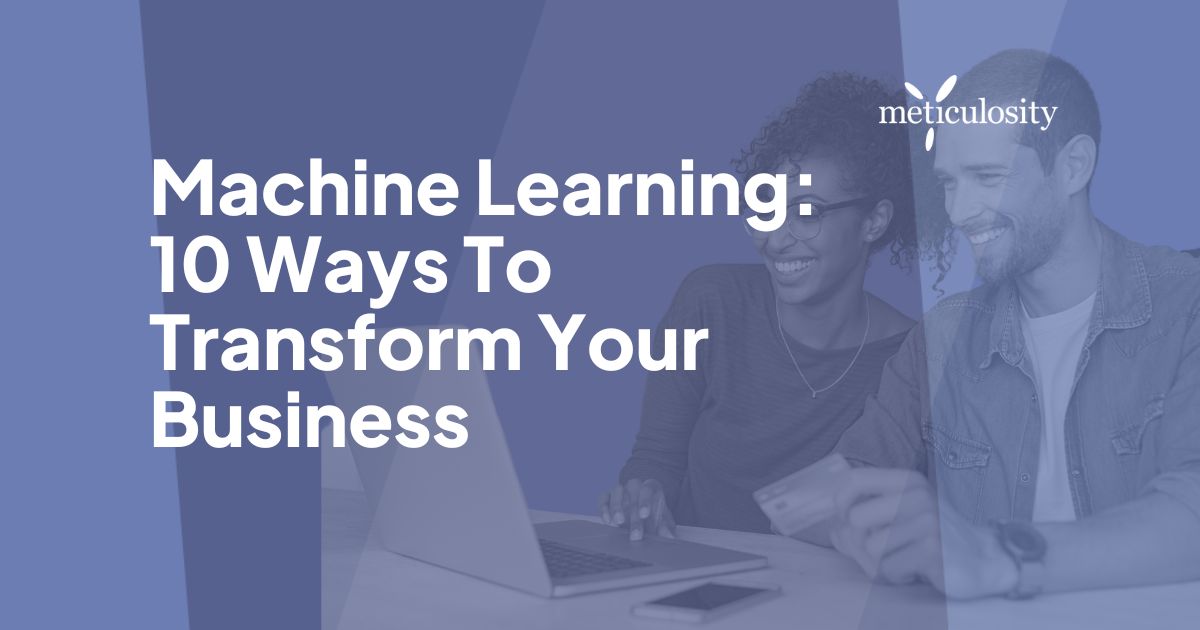Machine learning is no longer just a buzzword, it's transforming businesses in every industry. It's a powerful tool that can help companies make sense of large amounts of data and automate processes.
But what exactly is machine learning? In this blog, we will cover the basics of machine learning algorithms and how it works. We'll then dive into 10 ways that machine learning can transform your business, from real-time chatbot agents to fraud detection and prevention.
We'll also explore how healthcare providers can leverage machine learning for predictive analytics and personalized treatment. Additionally, we'll discuss AI-driven strategies for protecting digital privacy and how marketers can use machine learning for marketing automation and personalization. So buckle up and get ready to learn about the amazing possibilities of machine learning!
Table of Contents
What is Machine Learning?
Machine Learning is a part of AI or Artificial Intelligence that enables computers to learn and enhance from experience, without being explicitly programmed. It uses algorithms to recognize patterns and make predictions based on data input.
).png?width=506&height=424&name=Blog%20images%20(Facebook%20Post%20(Landscape)).png)
Machine Learning finds diverse applications in areas like image recognition, natural language processing, and predictive analytics. It has the potential to revolutionize businesses by automating processes, improving decision-making, and enhancing customer experiences.
Machine Learning Basics
Machine learning involves the use of algorithms to identify patterns in data and automate decision-making processes. It empowers machines to learn from data input and make predictions without any human intervention.
Machine learning models have vast applications such as fraud prevention, image classification, and real-time chatbot agents. By leveraging machine learning analytics, businesses can enhance customer experience by automating mundane tasks such as customer service queries. Collecting historical data on anomalies can help companies detect fraud more effectively using machine learning algorithms.
Machine Learning Algorithms
Machine learning algorithms enable computer systems to analyze data, identify patterns, and make decisions without explicit programming. This type of artificial intelligence has countless practical applications such as fraud prevention, recommendation systems, speech recognition, and predictive analytics.
Implementing machine learning models in businesses requires properly organizing big data sets and hiring skilled data scientists or relying on experienced companies like Google or Amazon. By leveraging machine learning, businesses gain a competitive edge with better decision-making capabilities while improving customer service and experience.
How Does Machine Learning Work?
Machine Learning is a part of AI that teaches computer systems to learn from data without explicit programming. It trains models on large datasets for predictions and decisions. It can automate tasks, improve decision-making, and enhance customer experiences in businesses. Applications include image and speech recognition, natural language processing, and predictive analytics.
10 Ways Machine Learning Can Transform Your Business
Businesses across industries are leveraging machine learning to gain a competitive edge. Machine learning involves analyzing vast amounts of data to identify anomalies and patterns that aid in fraud prevention and risk assessment.
Amazon uses machine learning models to provide personalized product recommendations to customers while financial institutions leverage it for automation and optimization of supply chain operations. From chatbots providing real-time customer service to self-driving cars powered by neural networks, the use cases for machine learning are endless.
Real-time Chatbot Agents
Real-time chatbot agents leveraging machine learning models can provide 24/7 customer service, thereby enhancing the overall customer experience while simultaneously reducing employee workload.

These chatbots are capable of analyzing the interactions to improve their responses over time and can even drive lead generation and sales. The use of machine learning algorithms enables businesses to personalize these interactions based on individual preferences and behaviors. This integration with other systems such as CRM software adds another layer of automation to deliver a competitive edge.
Automated Process and Decision Support
Businesses can enhance their automated process and decision support with the help of machine learning. Machine learning models can automate routine tasks, minimize human intervention, and analyze vast amounts of data quickly, making it easier for businesses to gain a competitive edge.
By leveraging deep learning, neural networks, and natural language processing (NLP), businesses can achieve excellent results in supply chain optimization, fraud prevention, risk assessment, and quality control processes. The use of AI-powered chatbots provides real-time customer service experiences. Personalization is possible through analytics-based insights into customer behavior.
Customer Recommendation Engines
Businesses are leveraging the power of AI to enhance customer experience by using customer recommendation engines. These engines utilize machine learning models that analyze vast amounts of data to provide personalized recommendations based on a user's previous interactions with the brand.
Personalization is key in today's digital marketing landscape as it helps brands stand out and increase competitiveness. With the use of machine learning algorithms and predictive analytics, companies can target customers at the right time with the right message, without relying on human intervention.
Churn Modeling and Retention
Retaining customers is crucial for any business, and churn modeling is an excellent example of how machine learning can help. Using this technique, businesses predict when and why customers are likely to leave, enabling them to take proactive steps to retain their customer base.
By analyzing large amounts of customer data, machine learning models can identify factors contributing to customer loyalty and retention, helping businesses make better decisions. This data analysis has become increasingly important in the era of big data, where vast amounts of data require automation for efficient processing and decision-making.
Dynamic Pricing Optimization
Using dynamic pricing optimization is one of the excellent examples of how machine learning can transform businesses. This technique uses algorithms to adjust prices in real time based on demand, historical data, anomalies, and other factors. It helps businesses increase revenue, profitability, and customer satisfaction while making better decisions with minimal or no human intervention.
Businesses can leverage vast amounts of data to identify the right time for price adjustments for maximum impact. Additionally, machine learning models used for dynamic pricing optimization also assist in identifying anomalies that could be indicative of fraudulent activities. By applying this technique, businesses gain a competitive edge by staying ahead of market trends while improving customer service and experience.
Market Research and Segmentation
With the help of machine learning techniques, businesses can now automate market research to analyze vast amounts of data accurately. By segmenting customers based on demographics, behavior, or purchase history, businesses can better understand their customers' preferences and tailor their products or services accordingly.
Moreover, it helps them save time and resources while providing insights into customer behaviors. Machine learning is now an indispensable tool for analyzing data accurately and identifying patterns in customer behavior.
Fraud Detection and Prevention
Machine learning has revolutionized the way businesses operate, with fraud detection and prevention being one of its most critical use cases. With the ability to analyze vast amounts of data, ML algorithms can identify patterns that point to fraudulent behavior.
By creating models that detect fraud in real-time, companies can save both time and resources while reducing financial loss. Automation through machine learning makes it possible for businesses to focus on growth while ensuring their operations are safe from anomalies like spam or normal behavior outside the standard range.
Image Classification and Recognition
Automating mundane tasks such as identifying products, detecting manufacturing defects, and analyzing customer behavior is made easy with the use of machine learning models for image classification and recognition.
By accurately identifying objects in images based on specific features using algorithms like neural networks and natural language processing (NLP), businesses can save time while increasing efficiency and productivity. Personalizing customer experiences through deep learning-based image recognition has become an excellent example for many startups like Google, Amazon, Facebook, Microsoft, LinkedIn, and HubSpot adopting AI-driven strategies to gain a competitive edge in the market.
Operational Efficiency and Cost Savings
Machine learning is the key to achieving operational efficiency and cost savings in your organization. With its ability to automate mundane tasks, predict maintenance needs, optimize supply chains for better decisions, reduce fraudulent activities, and streamline customer service operations, the benefits are endless.
Leveraging machine learning models can lead to significant improvements in accuracy, productivity, and overall performance. This is an excellent example of how automation through artificial intelligence (AI) can give you a competitive edge by leveraging the vast amounts of data available today.
Leveraging Machine Learning for Healthcare
The use of machine learning models has revolutionized the healthcare industry by enabling faster processing of vast amounts of data. It has automated mundane tasks and prediction of anomalies while reducing human intervention. Healthcare providers leverage machine learning to provide personalized treatments for patients via chatbots such as Alexa or Siri.
They also rely on predictive analytics algorithms to optimize resource allocation, reduce costs, and streamline operations leading to better decisions at the right time. The integration of machine learning technology provides a competitive edge to healthcare startups against established firms in financial institutions like hedge funds.
Predictive Analytics in Healthcare
Leveraging predictive analytics in healthcare involves analyzing vast amounts of data using machine learning models and algorithms to identify patterns and anomalies. This helps doctors make better decisions about patient care plans, treatment options, and resource allocation.
Improving the accuracy of diagnosis and disease detection leads to earlier intervention and better patient outcomes. Healthcare organizations must ensure their data is properly collected, stored, and protected to leverage this technology effectively.
Personalized Treatment and Diagnosis
Machine learning has brought a revolution in the healthcare industry by providing personalized treatment and diagnosis options. ML algorithms analyze the patient's data to find anomalies and predict outcomes with accuracy.
It helps doctors personalize the treatment plan for better results. The technology also assists in drug development, remote monitoring of patients, and predicting the efficacy of potential treatments- all while reducing costs. With better decision-making abilities thanks to machine learning models, healthcare providers can increase efficiency while providing excellent care.
Disease Detection and Early Diagnosis
Early detection and diagnosis of diseases through machine learning have the potential to revolutionize the healthcare sector. By analyzing vast amounts of medical data, ML algorithms can predict diseases, identify risk factors & recommend preventative measures.
Personalized treatment & diagnosis is possible with machine learning models. Implementation of ML in healthcare requires careful consideration of privacy & security concerns along with ethical issues that may arise.
AI-Driven Strategy for Protecting Digital Privacy
In today's world, safeguarding digital privacy is critical. AI-driven strategies are pivotal in preventing data breaches and securing personal information. Automated threat detection and response systems help avoid potential attacks while intelligent access controls limit access to sensitive data.
Personalizing user privacy settings provide an added layer of security. Continuously monitoring and auditing privacy policies are equally vital to ensure optimum protection. With machine learning technology and anomaly detection models detecting any anomalies or suspicious behavior is made easy.
Data Privacy Challenges in the Digital Age
With data privacy being a significant concern in today's digital age, machine learning has become an essential tool for identifying and mitigating potential risks to sensitive customer data. By leveraging AI-driven strategies such as anomaly detection and predictive modeling, businesses can anticipate and prevent possible privacy breaches before they occur.
Compliance with regulations such as GDPR and CCPA requires implementing effective data protection measures that utilize machine learning algorithms. These tech solutions are crucial for ensuring that your business stays ahead of cyber threats and breaches while protecting users' sensitive information.
AI-driven Privacy Solutions
Data privacy is a critical concern in the digital age. Businesses can leverage AI-driven privacy solutions to protect sensitive customer information and adhere to privacy regulations. These solutions employ machine learning algorithms for identifying potential privacy risks proactively and mitigating them using data masking, encryption, and access controls. By implementing these solutions, businesses can build trust with their customers and show that they take privacy seriously while reducing the risk of costly data breaches.
How Marketers Can Leverage Machine Learning
As more businesses look to leverage artificial intelligence for marketing purposes, there are countless ways that machine learning models can be used to gain a competitive edge. Whether it's by automating mundane tasks or analyzing vast amounts of data to make better decisions, machine learning is quickly becoming a critical tool for marketers.
Some excellent examples of how machine learning is being used include the use of chatbots powered by AI for customer service on social media platforms like Facebook and LinkedIn. By leveraging these tools effectively, businesses can provide a better customer experience while also improving their bottom line.
Marketing Automation and Personalization
Machine learning technology has numerous use cases across multiple industries. One of its most important applications is marketing automation and personalization which enables businesses to tailor their marketing campaigns according to individual customer needs.
By leveraging artificial intelligence (AI) algorithms, marketers can identify anomalies in consumer behavior, automate mundane tasks, and offer personalized services at the right time through various channels including social media and mobile apps. Machine learning also helps optimize decision-making processes by analyzing vast amounts of data from diverse sources such as IoT networks, unstructured data, and historical data for predictive analytics.
Conclusion
Machine Learning can be a game-changer for businesses, helping organizations to make smarter decisions, automate processes, and boost efficiency. It has the potential to transform everything from customer service to healthcare and digital privacy.
By leveraging Machine Learning, marketers can create highly personalized content that speaks directly to their customer's needs and preferences. This can help increase engagement and drive conversions. Speak to our experts now for personalized assistance and expert support.








